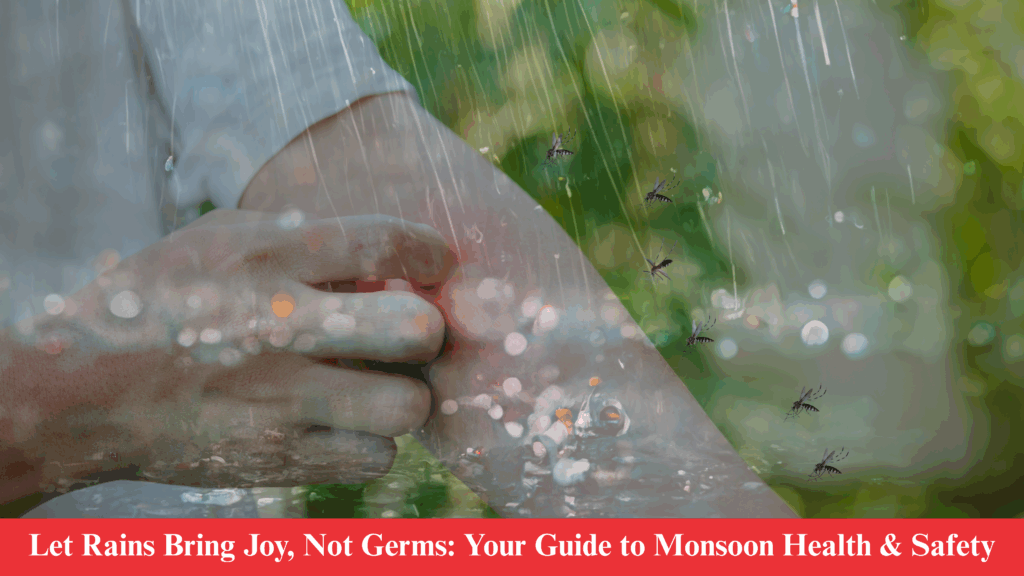
When the monsoon starts, it gives a respite from the scorching heat, turning the atmosphere into a green and peaceful paradise. However, beauty has its price, and the rains’ splendor comes at a cost, as during the rainy season there is a heavy outbreak of diseases owing to high humidity, waterlogging, and poor sanitation. Precautions taken in time will keep you and your family members safe and healthy, and you will enjoy the best of the monsoon.
Common Monsoon Diseases You Should Know to Remain Safe:
Dengue and Chikungunya:
Chikungunya virus is transmitted to humans through the bite of an infected mosquito. Water accumulation in and around homes creates breeding points for mosquitoes that transmit Chikungunya. Its symptoms include high fever, body aches, rashes, and joint pain.
Malaria:
It is yet another disease caused by mosquitoes, resulting from the bite of an infected Anopheles mosquito. Chills, fever, sweating, and aching muscles are the symptoms.
Typhoid:
Contaminated water and food, particularly under unhygienic conditions, spread typhoid. Some of the common symptoms include high fever, weakness, stomach pain, and loss of appetite.
Leptospirosis:
Leptospirosis is a waterborne bacterial infection caused by the bacteria Leptospira, and it can infect humans and animals. This is transmitted by walking on flooded streets and exposing yourself to contaminated water with animal urine. High fever, pain in muscles, vomiting, and organ damage in severe infections are some of the effects it may lead to.
Viral Fever and Cold:
The sudden temperature changes, wet clothes, and increased allergens, along with atmospheric conditions, result in viral infections, the common cold, cough, and fever.
Gastrointestinal Infections:
Infections caused by water and food, including cholera, diarrhea, and food poisoning, occur commonly during monsoon because of excess bacterial growth due to the humid climate.
Precautions to Stay Healthy During Monsoon
✅ Avoid Stagnant Water:
Regularly inspect your surroundings for stagnant water in flowerpots, tires, coolers, and roofs. Use mosquito repellents and netting to avoid bites.
✅ Practice Hygiene:
Regular hand washing, especially before eating. Maintain a dry and clean house to prevent bacteria and fungal growth.
✅ Drink Clean, Filtered Water:
Drink only filtered or boiled water. Avoid street foods and raw foods, as contamination is more common during rainy days.
✅ Prioritize immunity booster dieting habits:
Consume a healthy diet rich in fruits, vegetables, and immunity-boosting foods like ginger, garlic, turmeric, and Vitamin C.
✅ Dress Appropriately:
Wear light and loose-fitting clothes and stay dry. Carry an umbrella or raincoat and avoid walking barefoot in puddles.
✅ Give Special Care to Skin and Feet:
Fungal infections such as ringworm and athlete’s foot are frequent. Dry feet and apply antifungal powders if needed.
✅ Visit a Doctor When Ill:
Do not self-medicate. Early diagnosis and treatment of any rash, fever, or gastrointestinal problem can avoid complications.
How Diagnostic Tests and Regular Health Check-ups Assist During Monsoon
Early identification is extremely crucial in the management of monsoon-borne diseases. Diagnostic tests and health check-ups performed on time can aid in the proper diagnosis and early intervention. For example,
•Dengue NS1 Antigen & IgM tests
•Malaria Antigen or Peripheral Smear
•Widal test for Typhoid
•Leptospira IgM
•Complete Blood Count (CBC)
•Stool examination in diarrhea cases
Consult your physician for the appropriate tests based on the symptoms.
Final Thoughts
Monsoon is a time of joy, but it also demands some additional precautions when it comes to health. Simple precautions, proper hygiene, and caution regarding potential hazards can keep you and your family members safe from common rainy season diseases. Prepare yourself, be cautious, and enjoy the rain’s magic without compromising your well-being.
At Atulaya Healthcare, we understand the importance of early diagnosis, especially during the time of the rainy season when infections become so contagious. Our state-of-the-art labs and professional team of healthcare providers ensure thorough diagnostic tests like Dengue NS1 Antigen, Malaria Antigen, Typhoid (Widal), Leptospira IgM, CBC, and stool examination—all under one umbrella. With the latest labs, rapid turnaround time, and accurate reporting, Atulaya Healthcare ensures the right diagnosis at the right time. We even have home sample collection for your convenience so that you don’t have to step out in the rain.
